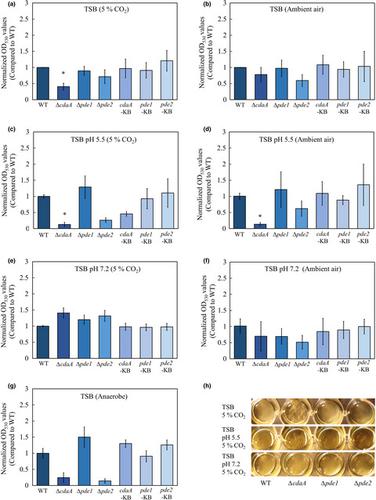当前位置:
X-MOL 学术
›
Microbiologyopen
›
论文详情
Our official English website, www.x-mol.net, welcomes your
feedback! (Note: you will need to create a separate account there.)
The c-di-AMP signaling system influences stress tolerance and biofilm formation of Streptococcus mitis
MicrobiologyOpen ( IF 3.9 ) Pub Date : 2021-07-19 , DOI: 10.1002/mbo3.1203 Gro Herredsvela Rørvik 1 , Ali-Oddin Naemi 1 , Per Kristian Thorén Edvardsen 1 , Roger Simm 1
MicrobiologyOpen ( IF 3.9 ) Pub Date : 2021-07-19 , DOI: 10.1002/mbo3.1203 Gro Herredsvela Rørvik 1 , Ali-Oddin Naemi 1 , Per Kristian Thorén Edvardsen 1 , Roger Simm 1
Affiliation

|
Streptococcus mitis is a commensal bacterial species of the oral cavity, with the potential for opportunistic pathogenesis. For successful colonization, S. mitis must be able to adhere to surfaces of the oral cavity and survive and adapt to frequently changing environmental conditions. Cyclic-di-AMP (c-di-AMP) is a nucleotide second messenger, involved in the regulation of stress responses and biofilm formation in several bacterial species. Cyclic-di-AMP is produced by diadenylate cyclases and degraded by phosphodiesterases. We have previously shown that in S. mitis, one diadenylate cyclase (CdaA) and at least two phosphodiesterases (Pde1 and Pde2) regulate the intracellular concentration of c-di-AMP. In this study, we utilized S. mitis deletion mutants of cdaA, pde1, and pde2 to analyze the role of c-di-AMP signaling in various stress responses, biofilm formation, and adhesion to eukaryotic cells. Here, we demonstrate that the Δpde1 mutant displayed a tendency toward increased susceptibility to acetic acid at pH 4.0. Deletion of cdaA increases auto-aggregation of S. mitis but reduces biofilm formation on an abiotic surface. These phenotypes are more pronounced under acidic extracellular conditions. Inactivation of pde1 or pde2 reduced the tolerance to ciprofloxacin, and UV radiation and the Δpde1 mutant was more susceptible to Triton X-100, indicating a role for c-di-AMP signaling in responses to DNA damage and cell membrane perturbation. Finally, the Δpde2 mutant displayed a tendency toward a reduced ability to adhere to oral keratinocytes. Taken together, our results indicate an important role for c-di-AMP signaling in cellular processes important for colonization of the mouth.
中文翻译:

c-di-AMP信号系统影响轻链球菌的应激耐受性和生物膜形成
轻症链球菌是口腔的一种共生细菌,具有潜在的机会性发病机制。为了成功定殖,轻链球菌必须能够粘附在口腔表面并存活并适应频繁变化的环境条件。 Cyclic-di-AMP (c-di-AMP) 是一种核苷酸第二信使,参与多种细菌物种的应激反应和生物膜形成的调节。环二腺苷酸 (Cyclic-di-AMP) 由二腺苷酸环化酶产生并被磷酸二酯酶降解。我们之前已经证明,在S. mitis中,一种二腺苷酸环化酶 (CdaA) 和至少两种磷酸二酯酶(Pde1 和 Pde2)调节细胞内 c-di-AMP 浓度。在本研究中,我们利用S. mitis的cdaA 、 pde1和pde2缺失突变体来分析 c-di-AMP 信号传导在各种应激反应、生物膜形成和真核细胞粘附中的作用。在这里,我们证明 Δ pde1突变体在 pH 4.0 下表现出对乙酸敏感性增加的趋势。 cdaA的缺失会增加轻链球菌的自动聚集,但会减少非生物表面生物膜的形成。这些表型在酸性细胞外条件下更加明显。 pde1或pde2的失活降低了对环丙沙星和紫外线辐射的耐受性,并且 Δ pde1突变体对 Triton X-100 更敏感,表明 c-di-AMP 信号在 DNA 损伤和细胞膜扰动反应中发挥作用。最后,Δ pde2突变体表现出粘附口腔角质形成细胞的能力降低的趋势。 综上所述,我们的结果表明 c-di-AMP 信号传导在对口腔定植很重要的细胞过程中发挥着重要作用。
更新日期:2021-07-20
中文翻译:

c-di-AMP信号系统影响轻链球菌的应激耐受性和生物膜形成
轻症链球菌是口腔的一种共生细菌,具有潜在的机会性发病机制。为了成功定殖,轻链球菌必须能够粘附在口腔表面并存活并适应频繁变化的环境条件。 Cyclic-di-AMP (c-di-AMP) 是一种核苷酸第二信使,参与多种细菌物种的应激反应和生物膜形成的调节。环二腺苷酸 (Cyclic-di-AMP) 由二腺苷酸环化酶产生并被磷酸二酯酶降解。我们之前已经证明,在S. mitis中,一种二腺苷酸环化酶 (CdaA) 和至少两种磷酸二酯酶(Pde1 和 Pde2)调节细胞内 c-di-AMP 浓度。在本研究中,我们利用S. mitis的cdaA 、 pde1和pde2缺失突变体来分析 c-di-AMP 信号传导在各种应激反应、生物膜形成和真核细胞粘附中的作用。在这里,我们证明 Δ pde1突变体在 pH 4.0 下表现出对乙酸敏感性增加的趋势。 cdaA的缺失会增加轻链球菌的自动聚集,但会减少非生物表面生物膜的形成。这些表型在酸性细胞外条件下更加明显。 pde1或pde2的失活降低了对环丙沙星和紫外线辐射的耐受性,并且 Δ pde1突变体对 Triton X-100 更敏感,表明 c-di-AMP 信号在 DNA 损伤和细胞膜扰动反应中发挥作用。最后,Δ pde2突变体表现出粘附口腔角质形成细胞的能力降低的趋势。 综上所述,我们的结果表明 c-di-AMP 信号传导在对口腔定植很重要的细胞过程中发挥着重要作用。











































 京公网安备 11010802027423号
京公网安备 11010802027423号